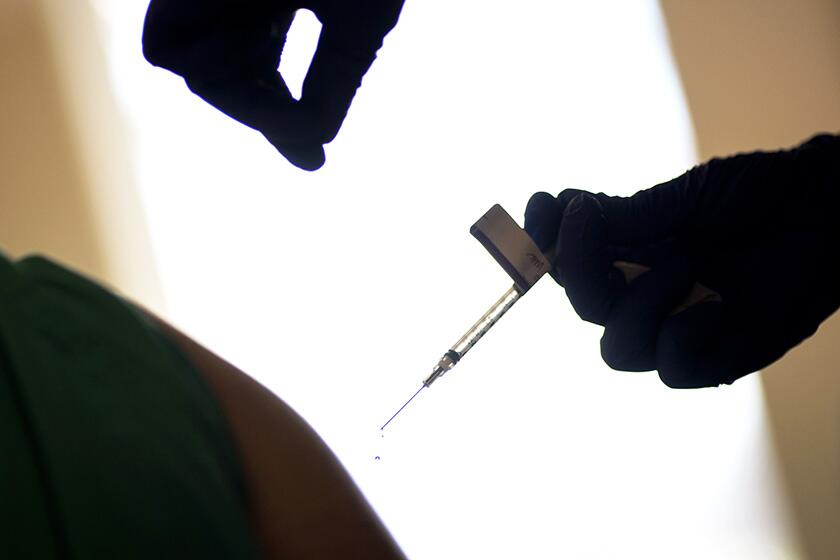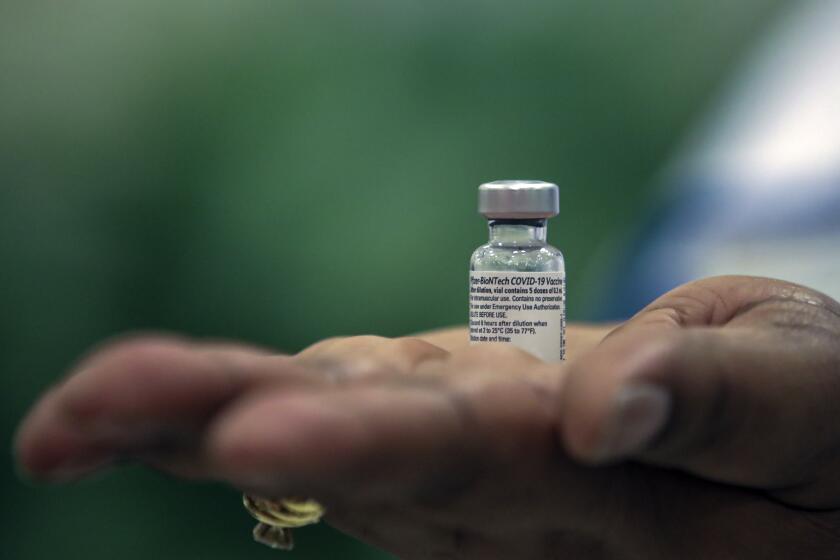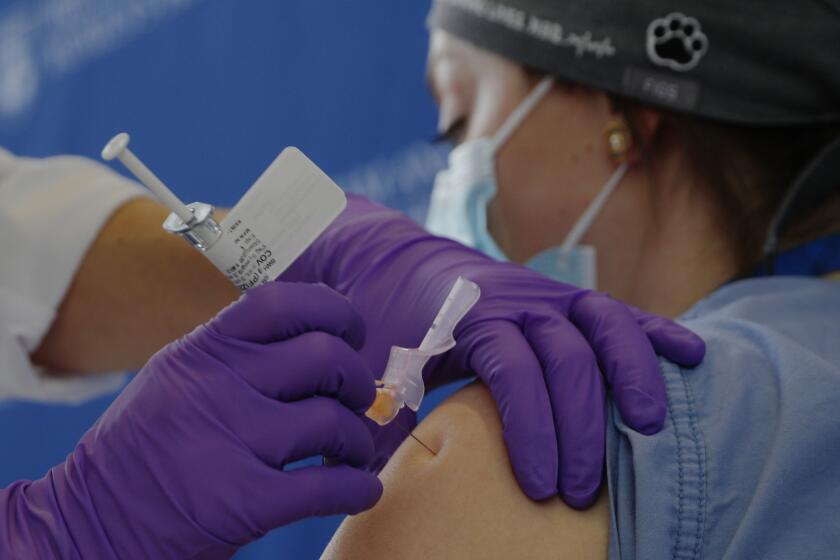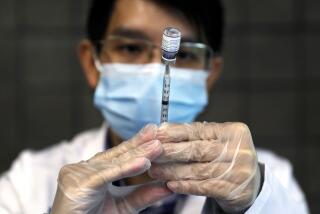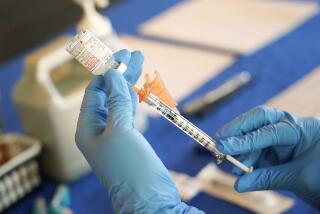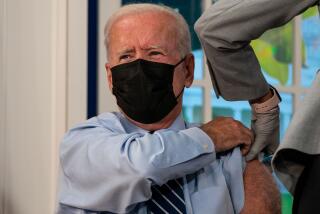As COVID-19 vaccines come online, fewer Americans want to take them
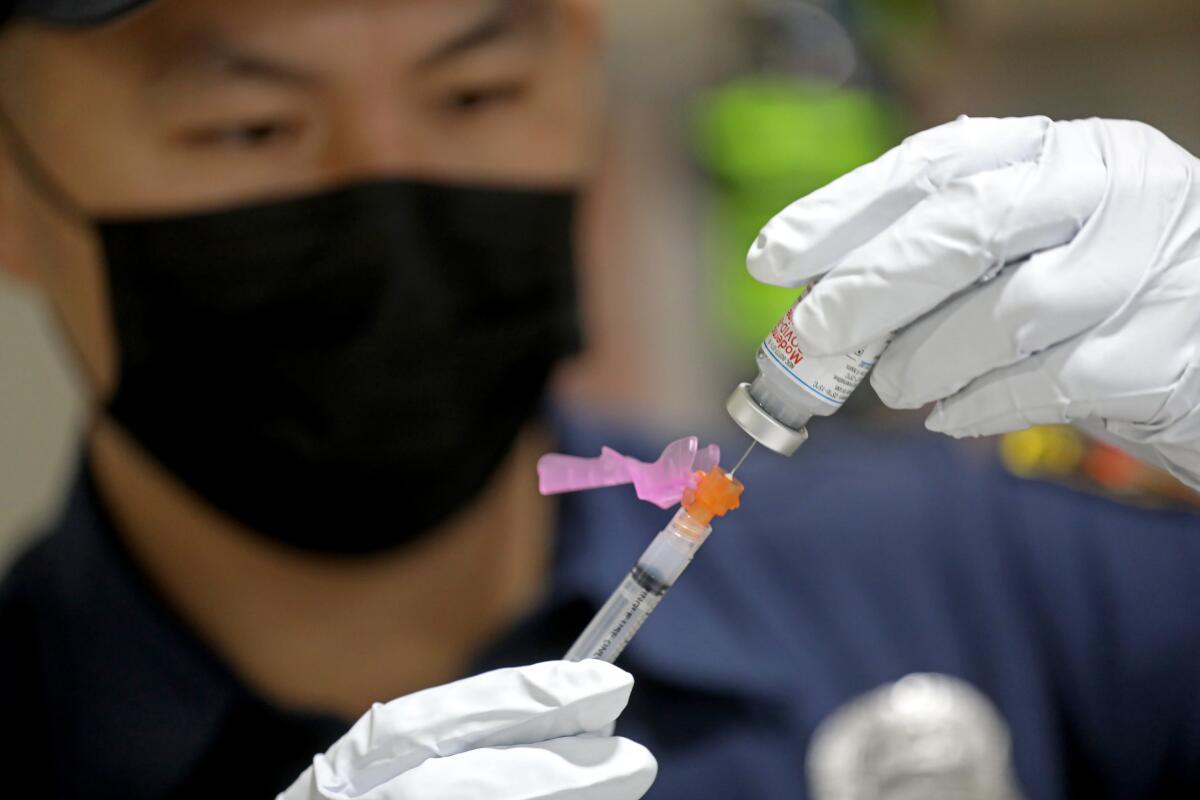
- Share via
Health experts agree that the best way to end the COVID-19 pandemic is to vaccinate our way out of it. Unfortunately, Americans’ willingness to get a COVID-19 vaccine is waning, even as a punishing third wave claims well over 1,000 U.S. lives each day.
The latest evidence for this appears this week in the Journal of the American Medical Assn., and it shows that skepticism toward the vaccines is on the rise among Americans of all stripes.
Regardless of age, race or sex, U.S. adults were significantly less likely to say they’d get vaccinated in late November and early December than they were in early April. And though interest in COVID-19 vaccines has waned across the board, some groups of Americans are even less willing to be vaccinated than others.
Overall, 74.1% of U.S. adults surveyed between April 1 and April 14 said they were either “somewhat” or “very” likely to get a COVID-19 vaccine when it became available to them. At the time, the country had confirmed about 550,000 coronavirus infections, and nearly 22,000 people had died as a result, according to data from the World Health Organization.
Fast-forward to the end of the year. Between Nov. 25 and Dec. 8, 56.2% of U.S. adults were still planning to get vaccinated when their turn came. This despite the fact that by the end of that survey period, more than 14.5 million Americans had been infected and about 280,000 had died, according to the WHO.
The question of how many people must be vaccinated to reach herd immunity against COVID-19 is of crucial importance. Experts say the number is probably higher than previously thought.
Women are less likely than men to accept the vaccine. In recent weeks, only 50.6% of them said they planned to get vaccinated, down from 69.5% in April. Among men, interest in immunization fell from 79.1%in the spring to 62.3% eight months later.
When asked recently, 80.6% of Asian Americans said they would get a COVID-19 vaccine. It sounds like a lot, but it was even higher in April — 90.9%.
No other racial or ethnic group is anywhere near as interested in a COVID-19 vaccine. Only 58.6% of white Americans surveyed in November and December said they’d get one (down from 77.8% in April), along with 52.7% of Latinx Americans (down from 73.1%) and a mere 37.6% of Black Americans (down from 50.7%).
Health experts hope to nudge people of color to the front of the COVID-19 vaccine line without explicitly saying race, ethnicity influence priority.
Enthusiasm for COVID-19 vaccines increases with age — but that, too, has diminished over time. Americans ages 65 and up remain most keen on the vaccine, with 69.1% of those surveyed recently saying they’d get it. That compares with 57% of people ages 50 to 64 and 50.9% of people in the 18-to-49 age group.
Back in April, 69.1% was the low end of the spectrum; that was the percentage of 18-to 49-year-olds who said they planned to get vaccinated. They were joined by 76.7% of people in the 50-to-64 age group and 83.8% of senior citizens.
The study also examined differences associated with educational background. The authors found that the more time people spent in school, the more likely they were to want a vaccine.
In November and December, 70.3% of those who had finished college said they planned to get vaccinated when they could (down from 85% in April). At the other end of the spectrum, 47.6% of those with a high school diploma or less intended to get vaccinated (down from 67% in April).
Americans waiting their turn for a COVID-19 vaccine may not be pleased to see who’s in line ahead of them. Does a prisoner or smoker deserve it more?
The results come courtesy of USC’s Understanding America Study, which has been asking members of a nationally representative panel about issues related to COVID-19 every two weeks since March. Unlike other surveys that measured Americans’ sentiments about COVID-19 vaccines at a single point in time, this one has tracked changes in the same group of more than 8,000 people since the early days of the pandemic. (In each two-week period, between 5,259 and 6,139 answered the questions they were asked, in either English or Spanish.)
Although the U.S. Food and Drug Administration hadn’t authorized any COVID-19 vaccines by the time the last survey was completed, early results from clinical trials suggested the vaccine candidates from Pfizer and BioNTech and from Moderna were safe and highly effective.
But even that good news couldn’t stem a nearly 18 percentage-point drop in Americans’ willingness to be vaccinated, the authors of the JAMA report lamented.
“Educational campaigns to raise the public’s willingness to consider COVID-19 vaccination are needed,” concluded the team of researchers from USC, UCLA and the Los Angeles County Department of Public Health.
“Low likelihood of getting a COVID-19 vaccine among Black individuals and those with lower educational backgrounds is especially concerning because of their disproportionately higher burden from COVID-19 disease,” they added.
